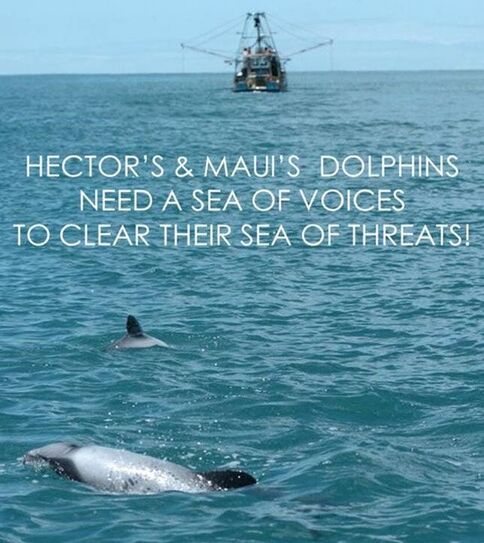Saving New Zealand's
|
Extinction looms for Māui and Hector's dolphins
Māui and Hector's dolphins are the smallest and rarest marine dolphins on earth and New Zealand's only native dolphin species. Fishing with gillnets and trawl nets has killed them almost to the point of extinction. Commercial and recreational fishing is decimating Māui and Hector's dolphins because less than a fifth of their habitat is protected. Both subspecies inhabit coastal waters up to a depth of 100 metres: Hector's primarily around the South Island and Māuis mainly off the west coast of the North Island.
Māui and Hector's dolphins have suffered devastating declines since the 1970s. Today just 10,000 Hector's dolphins survive – a mere third of the original population. Although there are only around 50 Māui dolphins left on earth, fishing with gillnets and trawl nets is still permitted across 81% and 95% of their habitat, respectively. The dolphins' extinction is inevitable under these conditions.
Māui dolphins have become so rare that they can only cope with a single death due to human activities every 10-23 years. Yet fisheries bycatch alone kills an estimated 3-4 individuals each year. That's over 54 times more than the sustainable limit.
Māui dolphins have become so rare that they can only cope with a single death due to human activities every 10-23 years. Yet fisheries bycatch alone kills an estimated 3-4 individuals each year. That's over 54 times more than the sustainable limit.
Saving Māui and Hector's dolphins is a race against time
Māui dolphins are on the very cusp of extinction. Just 13 of the last surviving 50 individuals are females that are old enough to breed. At least one of these females died last year – she was about to give birth. We cannot lose another one! Many Hector's dolphin populations around the South Island, too have become dangerously small and are at risk of being wiped out. At least two have been reduced to 45 individuals or less, and one, off the north coast of the South Island is down to around 200.
Gillnetting and trawling throughout the dolphins' habitat must endThe world's largest conservation assembly, the IUCN World Conservation Congress, has urged the New Zealand Government to protect Māui and Hector's dolphins against gillnetting and trawling throughout their range, to a water depth of 100 m from shore. The move was supported by 576 government and NGO votes in favour. New Zealand alone voted against it. Māui and Hector's dolphins are facing extinction and can't hang on much longer. They need protection now!
The time to act is now!Right now, the New Zealand government is reviewing the way Māui and Hector's dolphins are protected. Therefore, this is the perfect time to take a stand and tell New Zealand to extend the protection of Māui and Hector's dolphins throughout their home. It is the only way we can save them.
|



